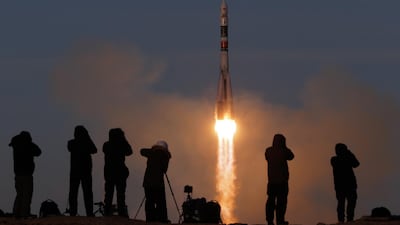About 1500 miles from Moscow, in the barren desert of Kazakhstan’s steppe, is the Baikonur Cosmodrome. Once the centrepiece of the Soviet Union’s space programme, it is hallowed ground for space geeks.
Baikonur saw the launch of the Sputnik satellite and the first human space flight. Today it is still in use, in fact a three-man crew – from Russia, the United States and Italy – blasted into orbit from Baikonur on the very weekend that the world was commemorating the 50th anniversary of Apollo 11’s visit to the Moon.
But Baikonur also houses a timely reminder of the economic perils of space travel. Not far from the main launch pad is a deserted hangar containing ghostly remnants of the Buran programme – the USSR’s answer to Nasa’s Space Shuttle. Two incomplete Buran shuttles and a gigantic rocket sit gathering dust, rust and cobwebs, abandoned and almost forgotten.
Dedicated adventurers have managed to sneak past the Cosmodrome’s security and capture photos of the craft, and a museum in Germany once apparently put in a $12 million (Dh44m) bid to buy one, before the cost of getting it from Kazakhstan put paid to the idea. But the poor old Burans remain grounded while their modern cousins soar into space just metres away.
Part of the Burans’ problem was bad timing; as they were nearing readiness, the crumbling USSR had bigger terrestrial problems to worry about. So, while experts say the Burans may even have been superior to the Space Shuttle, the programme looked like an expensive folly.
If this seems like an indulgent preamble, please forgive me; I am a secret space geek myself. But with the Apollo 11 celebrations, the remarkable exploits of SpaceX and the opening of Virgin Galactic’s Spaceport America, the Buran story feels worth revisiting. Going into space is fiendishly expensive. Between 1960 and 1973, NASA spent $28 billion on the Apollo programme. The Planetary Society puts that at around $288.1bn in today’s money. Now, with space travel suddenly back in vogue, interstellar economics are in focus once again.
With the global economy facing serious challenges, some critics argue space travel is about big egos making flashy statements. While it’s tempting to paint the likes of Elon Musk, Richard Branson and Donald Trump with that galactic brush, the conquest of space actually impacts life on earth in profoundly important ways.
Last month I interviewed Nasa administrator Jim Bridenstine, who outlined modern society’s dependence on GPS. From banking transactions to the power grid, via mobile communications and navigation, satellites are utterly intrinsic to the global economy. Take them out and the impact would be catastrophic.
Partly because of this, Bridenstine told me, the US now has extra motivation to double down on going up into orbit to protect America’s interests. Next month, Congress looks set to approve a new US ‘Space Force’ – once they can agree on what to actually call it.
While 15 countries have been collaborating happily in the International Space Station, China is poised to launch its own, military-controlled equivalent with a rather less communal feel. Even space debris (Nasa is tracking more than half a million rogue bits of orbiting junk) poses a serious threat to the satellite network. The problem for Nasa, to paraphrase David Bowie, is that the end of the space race left them floating in a most peculiar way. The question now is how defence, telecoms and opportunities like intergalactic mining can be safeguarded without another deficit-churning space race.
Nasa’s answer is to let public companies take over a raft of operations, and in doing so create whole new industries. Put simply, the only reason we are looking at space travel seriously again is down to private enterprise. This is not just about $250k a ticket space tourism. The private sector has brought financial rigour to the launch pad; while new rockets have soared, costs have plummeted.
Space Angels is one such company capitalising on the investment opportunity this presents. The venture capitalist firm says space companies raised $1.7bn in equity in the first quarter of 2019. Its chief executive Chad Anderson, told me private operations are bringing efficiencies that were unthinkable to the previously closed shop of contractors in government-led space programmes. The likes of SpaceX, with cost-effective, reusable technology, are taking control of the lower earth orbit eco-system. The cost of cargo on board the Space Shuttle was around $54,000 per kilo; SpaceX’s Falcon 9 can carry that for just $2,750.
For investors, the scope and variety of investment vehicles is galactically vast, and the move from state to private control is democratising access. The UAE is among countries joining the space community. Its partnership with French agency CNES has seen the Europeans open up shop in Abu Dhabi, and Virgin Galactic has seen major investment from the Emirates ahead of its mooted public listing. The UAE is even putting palm seeds onto the International Space Station, in an experiment that could yield important results for an essential crop.
However, free access is not without its dangers – and not every participant may have benign intentions. Space is remarkably unregulated, and the risk that unfettered admission to the cosmos could lead to conflict, endangering our precious satellite system, is real.
But maybe there is a positive side here, too: during the Cold War, the USA and Soviet Union found uneasy common ground in space, collaborating in ways that were impossible on earth. Today, with new countries, companies and technologies combining to make space travel more economical, even as the geopolitical landscape fractures, the idea that the conquest of space can give us hope of a better life on earth might not be science fiction after all.

